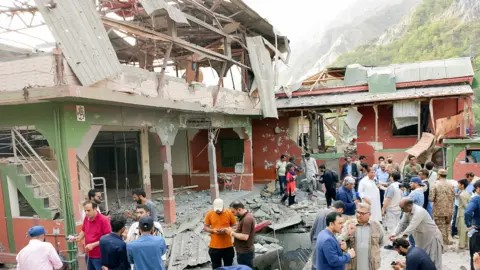Pakistan’s identity as a fountainhead of terror and a safe haven for various militant groups is a widely-acknowledged reality

At the break of the dawn on Wednesday, it was a jubilant nation that woke up to the news of “Operation Sindoor,” a response by the Indian military to the Pahalgam terror attack. The operation involved airstrikes against terrorist hideouts in Pakistan and Pakistan-Occupied Kashmir, targeting nine sites in total.
The news of India’s missile strike on strategic terror module locations in Pakistan and Pakistan occupied Kashmir in retaliation to the tourist killings in Pahalgam took one’s mind back to those series of ‘befitting’ replies by the Indian armed forces in the wake of the ‘Uri’ and ‘Pulwama’ terror strikes which were intended to teach our inimical neighbour a lesson.
Rightly described as India’s war on terror, especially Pakistan-orchestrated ones, the strikes in response to the mayhem at the meadows of Balsaran targeted camps and launchpads used by the Lashkar-e-Taiba, the Jaish-e-Mohammed, and the Hizbul Mujahideen. These are primarily the terror groups largely responsible for organizing terror attacks in India over the past several years.
‘Operation Sindoor’ as the first tri-services military operation since the 1971 war with Pakistan was ‘focused, measured, and non-escalatory’ and avoided any Pakistani military facilities. In fact, the responses displayed India’s defence capability and affirmed its right to defend itself against terrorism.
According to the press release issued by the Ministry of Defence way back on February 2020:
“The surgical strike of 2016 and Balakot airstrikes of 2019 were not just military strikes but a strong message to the adversary that terror infrastructure across the border cannot be used as a safe haven to wage low-cost war against India.”
The Defence Minister had very categorically stated then that India’s out-of-the-box response reflected in the Balakot strikes forced the rewriting of many doctrines across the LoC and the adversary has to think hundred times for any future misadventures.
“Our approach to terrorism was and will remain a judicious combination of clinical military action and mature and responsible diplomatic approach,” the Raksha Mantri had said then. The execution of ‘Operation Sindoor’ echoes the sentiments of the Defence Minister on cross-border terrorism and ways and means to contain it.
In the wake of the escalating tensions between India and Pakistan, celebrities have taken to social media to express their opinions. One such comment by a film star reads thus:
“A nation’s right to defend itself against terror should not be misunderstood as a thirst for war. Those who support a strong response are not warmongers; they are citizens who value security and justice.”
“There is a profound moral difference between unprovoked aggression and necessary defence. When innocent lives are lost in a deliberate act of terror, a measured response becomes a responsibility, not a choice. Seeking peace does not mean accepting harm in silence.”
“Don’t question the nation that retaliates. Question the one that sends terror across borders.”
The day however was a tribute to the ‘Nari Shakti’ which took centre stage during a press briefing on ‘Operation Sindoor’ held at National Media Centre as two accomplished women military officers joined Foreign Secretary Vikram Misri in giving details about the precision strikes.
Colonel Sofiya Qureshi from the Corps of Signals and Wing Commander Vyomika Singh, a helicopter pilot, are household names by now, at least social media posts have ensured that.
The deep symbolism embedded in the codename of the operation cannot but be interpreted as an acknowledgment of the strength and sacrifice of Indian women.
It has however been observed that a hyperactive social media is already playing a significant role in amplifying and distorting information about the escalating situation between the two countries.
With Pakistan taking a pounding in the ‘retaliatory’ action by the Indian armed forces, citizens have been alerted to be vigilant against a surge of Pakistan-sponsored propaganda expected on various social media platforms.
Pakistan’s identity as a fountainhead of terror and a safe haven for various militant groups is a widely-acknowledged reality. Much has been written about Pakistan’s complex web of terror networks. “The country’s terror infrastructure has survived for decades within its security establishment, which views these forces as strategic assets.” (The Hindu)
But the rise and fragmentation of Pakistan’s terror landscape is now the hotly debated topic where today the country has slipped from the unenviable position of a ‘patron’ to that of a ‘prey’ in no time. In any case, banking on terror acts to disrupt peace in the neighbouring country can only be attributed to a nation that has had to contend with instability due to various reasons ever since its conception.
Just last month, Pakistan’s Defence Minister speaking to Sky News admitted to doing ‘dirty work’ for the US and the West when asked whether Islamabad has a history of funding, training and supporting terror groups. No cause justifies terror though!
However, the army and a few religious zealots that constitute the core of the powers that be in our neighbouring nation have endorsed terror as the only means to attract global attention for their inglorious existence. If a nation has to make incursions into enemy territory to dismantle terror infrastructure which is responsible for the bloody havoc being played out on its land, it speaks a lot for the insecurity that threatens the region.
Pakistan may proffer a thousand reasons to give a shade of justification for their aggressive stand just as India is perfectly justified in quelling any threats to its sovereignty.
However, considering the implications of a full-fledged war in the region, the prudence in stepping back from the brink of a major conflict is of essence here!
But as an unremorseful Pakistan very audaciously violated the ceasefire with India hours after it was declared, one is led to believe that our neighbour’s commitment to peace will always be a complex issue.